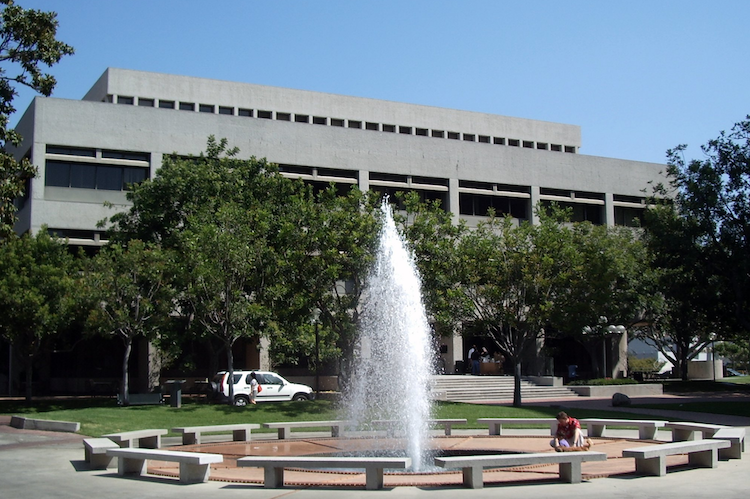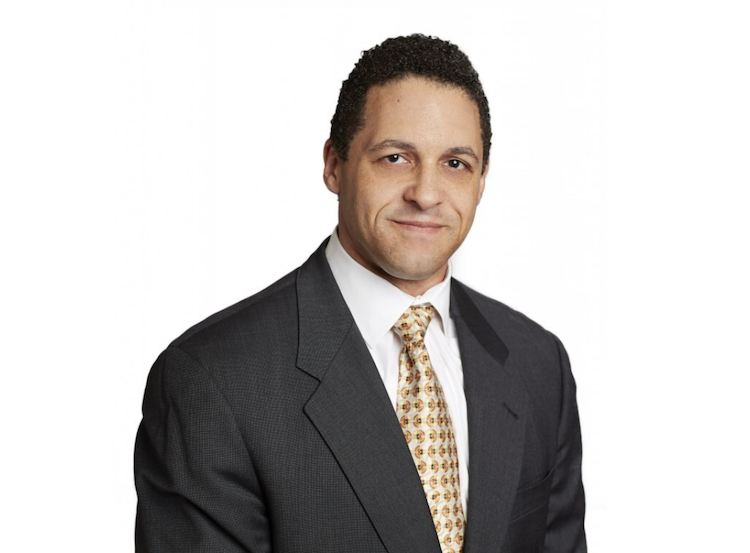Required USC course on race is expected to help law students with various viewpoints

The University of Southern California Gould School of Law. Photo from Wikimedia Commons.
Stephen M. Rich was asked in January to teach the first required course on race, racism and the law at University of Southern California’s Gould School of Law, and he happily accepted the task. He recognizes, though, that the student makeup of the course may be different than it would be for an elective course on the same topic.
“There will be students from both ends of the political spectrum. There will be very divergent views on things like criminal procedure. We have to accept that fact, and we have to make room for people to communicate clearly and professionally,” says Rich, who also has a master’s degree in African American studies and previously practiced law with Cleary Gottlieb Steen & Hamilton.
He doesn’t have a confirmed syllabus yet and intends to discuss plans with colleagues who also write and teach on race. Rich, who teaches civil procedure, employment law and the history of American civil rights law, sees two questions for the new class: How has race and racism influenced U.S. law, and how has American law influenced “the social phenomena of race and racism”?
Topics Rich plans to address include slavery, the emergence of federal Indian law, Jim Crow laws, the Progressive Era and the civil rights era. He will also examine the post-civil rights era, with discussions about affirmative action, post-racialism and the role of race in policing.
“I plan to take a historical approach because I think it will help to illustrate that impact,” he adds.
Titled “Race, Racism and the Law,” the three-unit course starts in the spring 2022 term and will be required starting with the class of 2024. The required course came from discussions in the community while summer 2020 unrest escalated across the nation following the killings of George Floyd and other African Americans by police.
 Stephen M. Rich teaches civil procedure, employment law and the history of American civil rights law at University of Southern California’s Gould School of Law.
Stephen M. Rich teaches civil procedure, employment law and the history of American civil rights law at University of Southern California’s Gould School of Law.
Like most law schools, USC currently offers elective civil rights courses, including classes on critical race theory. But the required course is different, says Laura Gómez, a UCLA School of Law professor and faculty director of the school’s critical race studies program.
“For a class like “Race, Racism and the Law,” there’s plenty of room for all perspectives,” she adds.
A handful of other law schools have required courses on race. Penn State Dickinson Law has had a mandatory class titled “Race and Equal Protection of the Law” since fall 2020, according to Danielle M. Conway, the school’s dean.
Also, students at the University of Nevada Las Vegas Boyd School of law are now required to take a course titled “Law and Inequality: Policing, Protest and Reform.” Kimberly M. Mutcherson, the co-dean of Rutgers Law School, told the ABA Journal in an email that they have a committee considering a required course on race, and she’s heard other law schools are also thinking about the issue. Conway and Mutcherson are part of a group of Black female deans who last summer started the Association of American Law Schools’ Law Deans Antiracist Clearinghouse Project.
The purpose of the USC class is to help students understand the role that racism plays in the law, says Franita Tolson, the vice dean for faculty and academic affairs at the law school.
“In the years leading up to this sort of societal backlash towards racism, there was a sense we were post-racial with the election of President Obama and the Supreme Court’s stance on the Voting Rights Act,” she explains, referring to the 2013 decision where the court in a 5-4 opinion found Section 4 of the law was unconstitutional.
The section set forth a formula for identifying jurisdictions with histories of restricting voting rights, and those jurisdictions were required to submit any proposed changes in voting procedures to the U.S. Department of Justice and a U.S. District Court for the District of Columbia panel.
“You had a post-racial narrative that was at odds with the people who live in our society. We want to systematically investigate that,” Tolson adds.
She would not share what the faculty vote was on requiring the course but did say it was widely supported by students, faculty and administration. When asked about the possibility some students won’t want to take the class, Tolson says law professors are used to people not wanting to take their classes.
According to Rich, students asked for the class because they wanted to engage in deeper discussions about the relationship between race and law. However, he admits there may be some who are resistant to the subject matter.
“Or they may not understand why we have chosen to make it required course. If that happens, I believe it is the instructor’s responsibility to demonstrate the course’s value, including its potential contributions to our students as future lawyers,” he adds.
Professors will trade off teaching the class. Much has been said recently about course content sometimes making students uncomfortable, and according to Rich, race comes up in first-year courses when it’s not expected, which can be disorienting for students, particularly some students of color. He adds that in classes such as “Race, Racism and the Law,” students should have an expectation that discussions are coming.
“The first thing to do is communicate to students your expectations about mutual respect and civility, and recognize we are going to talk about very difficult material. The 18th- and 19th-century subject matter can be very difficult. I’m African American, and I have a lot of difficulty working through material about slavery. We need to recognize those things and that what we will be reading will use language in a way we couldn’t speak today,” he says.
He doesn’t expect students to make malicious comments, but if a student says something in class others might perceive as insensitive, Rich says, it can be helpful to ask the speaker what he or she meant and whether that individual can see how someone else might hear what was said in a particular way.
“It gives the student an opportunity to reflect and clarify what he means,” Rich adds.
Learning how to discuss race in a thoughtful, professional way is great for law students, says Meera Deo, a professor at Thomas Jefferson School of Law who is also the American Bar Foundation’s 2020-2021 William H. Neukom Fellows Research Chair in Diversity and Law.
“Lawyers have to have conversations that are tricky. What I love about a course like this is it really signals that a basis of understanding race and racism in the law is needed to be a competent practicing professional,” she adds.
Write a letter to the editor, share a story tip or update, or report an error.


